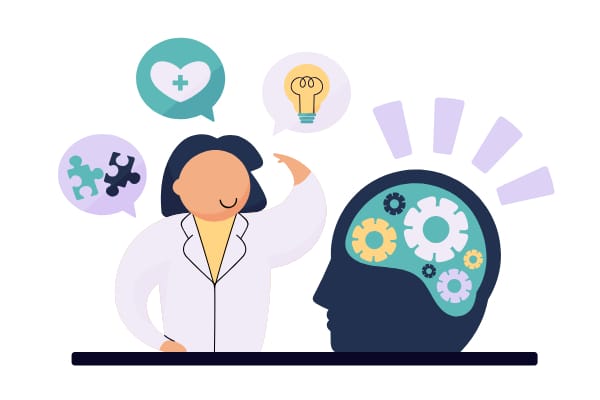Emotional Intelligence (EI) is increasingly recognized as a vital component of effective sales training. At its core, EI equips sales professionals with the skills to forge deeper connections with clients, cultivate trust, and ultimately achieve greater sales success. While technical knowledge and strategic acumen are essential for a career in sales, EI offers the interpersonal skills that can transform how sales professionals engage with clients, paving the way for long-lasting business relationships. Let's find out the role of EI in Sales Training.

I. Understanding the impact of Emotinal Intelligence in Sales Training
1. Self-Awareness
One of the most significant contributions of EI to sales training is the enhancement of self-awareness. Sales professionals who are self-aware can recognize and understand their own emotions, strengths, and weaknesses. This self-awareness enables them to reflect on their sales techniques and identify areas for improvement. For instance, if a salesperson recognizes that they tend to become defensive during objections, they can work on developing more constructive responses. By addressing these personal growth areas, they can refine their approach to better serve clients and enhance their effectiveness in the sales process.

2. Empathy
Another crucial element of EI in sales training is empathy. Empathy allows sales professionals to put themselves in their clients’ shoes, understanding their needs, motivations, and concerns from the client’s perspective. When salespeople demonstrate empathy, they can tailor their sales strategies to address specific client concerns and preferences. For example, a salesperson who empathizes with a client’s budget constraints might propose a flexible payment plan or a cost-effective solution, thereby increasing the chances of closing the deal. Empathy also helps in building genuine relationships, where clients feel valued and understood rather than just being sold to.
3. Relationship Management
Effective relationship management is another area where EI proves indispensable. Sales professionals with high EI are adept at handling complex interpersonal dynamics and maintaining positive relationships even in challenging situations. They navigate conflicts with diplomacy, resolve misunderstandings with tact, and build rapport that can lead to sustained business relationships. For instance, if a client is unhappy with a service or product, a salesperson with strong EI can manage the situation by acknowledging the client’s frustration, addressing their concerns, and working towards a satisfactory resolution, thereby preserving the relationship and potentially even strengthening it.
>>> Read more: Top sales training book you should read
>>> Read more: Addressing declining retail foot traffic issue
>>> Read more: Why is blended learning the future of corporate training
>>> Read more: Why is employee upskilling non-negotiable for business success
4. Communication skills
Communication is the linchpin of successful sales interactions, and EI significantly enhances this skill. Sales professionals who possess high EI are not only adept at articulating their messages clearly but also excel at active listening. This means they are fully engaged in conversations, paying attention to verbal and non-verbal cues, and responding thoughtfully. Effective communicators can adjust their style based on the client’s preferences, whether that means adopting a formal tone or a more conversational approach. By aligning their communication style with the client’s expectations, sales professionals can foster a more comfortable and productive dialogue.
Ready to take your Sales Training to the next level?

5. Incorporating Emotional Intelligence into Sales Training Programs
Integrating EI into sales training programs involves several strategies to ensure that sales professionals can develop and apply these skills effectively. Training programs should emphasize self-awareness exercises, such as reflective journaling or feedback sessions, which help salespeople understand their emotional responses and areas for growth. Empathy can be nurtured through role-playing scenarios where salespeople practice understanding and addressing client concerns from different perspectives.
Relationship management skills can be developed through workshops that focus on conflict resolution techniques and strategies for maintaining positive client interactions. Communication skills can be honed through activities that promote active listening and effective message delivery, such as communication skills workshops and peer feedback sessions.
Additionally, ongoing coaching and mentoring are essential to reinforce the principles of EI in real-world sales situations. Experienced sales leaders can model EI behaviors and provide guidance to less experienced sales professionals, helping them apply what they have learned in training to their day-to-day interactions with clients.
>>> Read more: Addressing declining retail foot traffic issue
>>> Read more: Why is blended learning the future of corporate training
>>> Read more: Why is employee upskilling non-negotiable for business success
>>> Read more: 10 ways that an LMS can revolutionize your corporate training
>>> Read more: 5 essential sales techniques every sales rep should master
6. The benefits of Emotional Intelligence in Sales Training
The incorporation of EI into sales training offers numerous benefits. Sales professionals who are emotionally intelligent are better equipped to build strong, trusting relationships with clients. This trust is crucial for securing sales and fostering long-term partnerships. High EI also contributes to a more positive sales experience for both clients and sales professionals, leading to greater job satisfaction and career fulfillment.
Moreover, sales professionals who develop high EI are often more resilient in the face of setbacks and challenges. They can navigate difficult situations with a balanced emotional perspective, maintain their motivation, and continue to strive for success despite obstacles.
II. Conclusion
In summary, Emotional Intelligence is a cornerstone of effective sales training. By focusing on self-awareness, empathy, relationship management, and communication skills, EI training empowers sales professionals to build stronger client relationships and achieve greater success in their careers. Integrating EI into sales training programs not only enhances individual sales techniques but also fosters a more fulfilling and prosperous career path for sales professionals. Embracing EI as a key component of sales training can lead to lasting improvements in how salespeople connect with clients and drive business growth.
Incorporating EI into sales training strategies is not merely an option but a necessity for those seeking to excel in the competitive world of sales. By focusing on these emotional and interpersonal skills, sales professionals can significantly enhance their effectiveness and career satisfaction, ultimately leading to more successful and rewarding professional experiences.
About us
At OOOLAB (pronounced 'uːlæb'), our mission is to make complex learning operations simple. We aim to positively impact the lives of over 1,000,000 learners and educators by the end of 2026.
OOOLAB's LearningOS provides educational institutions and corporate enterprises with an all-in-one solution to create and deliver engaging learning experiences.
Reach out to us at: Linkedin, FaceBook
What is LearningOS?
An All-In-One Sales Training Solution
Our platform is designed for dynamic hybrid sales training.
- Implement a flexible sales training program with instructor-led sessions, online or offline, 24/7.
- Assign engaging interactive and practical eLearning accessible anytime, anywhere.
- Get clear overviews of employee analytics to see who's hitting targets.
- Effortlessly share important resources internally and save time and effort.


